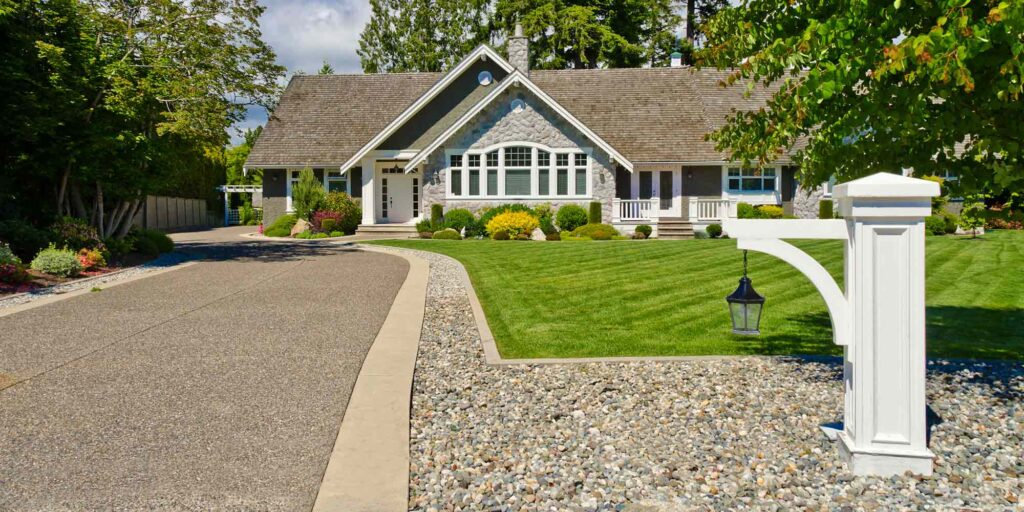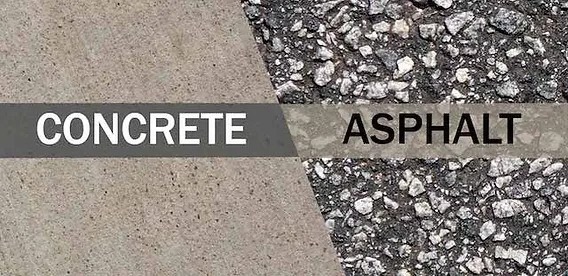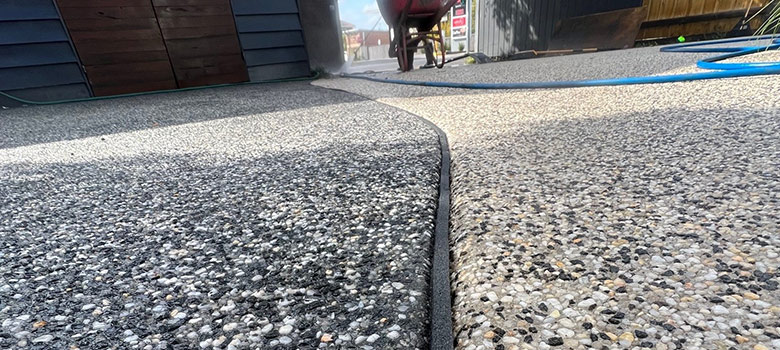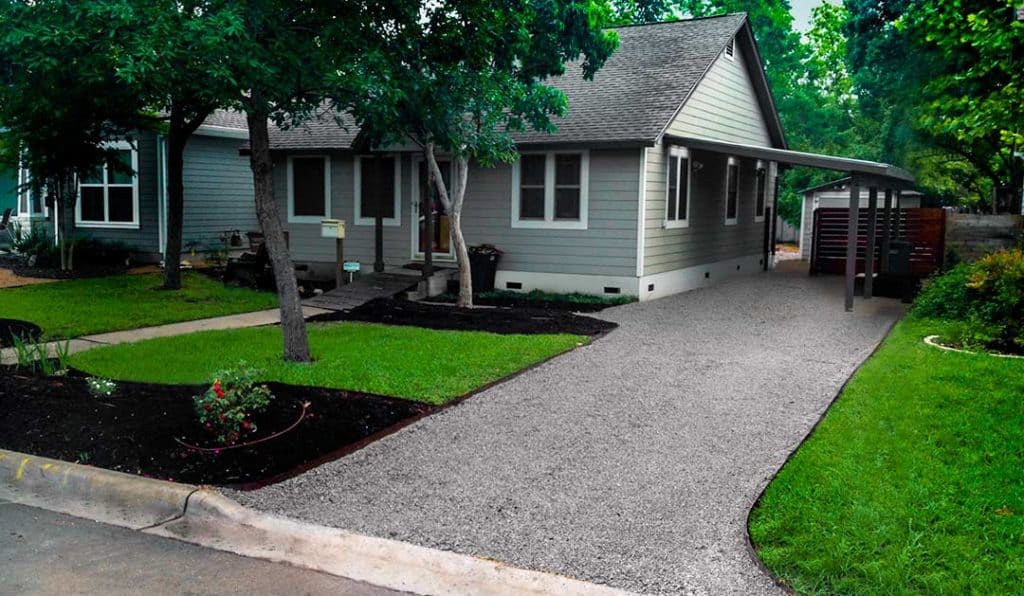Selecting the right driveway material is a crucial decision for homeowners aiming to enhance their property’s curb appeal while balancing costs and sustainability. With the growing emphasis on eco-friendly building practices, the choice of driveway material plays a pivotal role in reducing a home’s environmental footprint.

In Houston, where temperature fluctuations and heavy rainfall pose unique challenges, making informed decisions is essential. At RJT Construction, we understand these challenges and specialize in crafting durable and sustainable driveway solutions tailored to your needs.
This article explores the intersection of cost, durability, and environmental impact in driveway choices, focusing on concrete driveways and their long-term benefits. By delving into popular driveway materials, their ecological footprint, and innovative alternatives, we aim to guide homeowners in Houston toward making sustainable, cost-effective decisions that enhance their property’s value and environmental contribution.
The Growing Importance of Sustainable Driveway Materials
Why Sustainability Matters in Driveway Choices?
As climate concerns rise, adopting sustainable practices in home improvement projects has become a necessity. Driveways, often overlooked, have a significant impact on the environment. Traditional materials like asphalt can contribute to a higher carbon footprint due to energy-intensive production processes. Additionally, impermeable surfaces lead to storm water runoff, affecting local waterways and ecosystems.
Sustainable driveway materials offer solutions that not only minimize environmental harm but also improve water management through features like better water absorption. Beyond environmental benefits, these materials add to a home’s curb appeal and align with the growing demand for eco-friendly alternatives in the real estate market.
Comparing the Environmental Impact of Popular Driveway Materials
Homeowners have several options when it comes to driveway materials, each with varying levels of environmental impact:
- Concrete: While durable, traditional concrete has a high ecological footprint. Innovations like permeable concrete reduce runoff and improve sustainability.
- Asphalt: Commonly used but associated with higher maintenance needs and a larger carbon footprint.
- Gravel: An affordable choice with natural aesthetics but limited durability for heavy loads.
- Natural Stone: Offers unmatched aesthetic appeal and sustainability but comes with higher initial costs.
These comparisons emphasize the need for an informed decision that balances environmental impact, maintenance requirements, and property value. Sustainable driveway materials not only meet these criteria but also contribute to long-term cost savings.
Concrete Driveways: A Closer Look at Cost and Sustainability
Understanding the Lifecycle Costs of Concrete Driveways
Concrete driveways are a popular choice due to their durability and low maintenance. While the initial investment may be higher compared to alternatives like asphalt or gravel, their long-term cost savings make them an attractive option for homeowners in Houston. Concrete driveways require minimal upkeep, with periodic occasional cleaning and proper maintenance helping them withstand high temperatures and heavy loads.
Over time, the cost per year of maintaining a concrete driveway becomes significantly lower compared to asphalt, which requires regular sealing to maintain its integrity. Additionally, concrete driveways enhance the value of your home, providing an excellent return on investment.
How Concrete Driveways Contribute to Sustainable Building Practices?
Concrete driveways play a crucial role in sustainable construction, especially with advancements in eco-friendly materials. Modern techniques, such as using permeable concrete, allow for better water absorption, reducing runoff and aiding in stormwater management. Incorporating recycled materials, such as crushed concrete, further minimizes the ecological footprint of the installation process.
Moreover, concrete’s ability to reflect sunlight helps in reducing urban heat island effects, making it an environmentally friendly driveway option in areas like Houston, where high temperatures are a concern. These sustainable practices not only benefit the environment but also improve aesthetic appeal and functionality, making concrete an excellent choice for homeowners aiming to balance cost, durability, and environmental impact.
The Pros and Cons of Concrete vs. Asphalt Driveways
Durability and Maintenance: Concrete vs. Asphalt
When comparing concrete and asphalt driveways, durability is a key differentiator. Concrete driveways can last up to 30 years with minimal maintenance, whereas asphalt driveways require more frequent regular sealing and repairs, especially in climates with temperature fluctuations like Houston.

Concrete driveways also offer a smoother surface that resists cracking under heavy loads, whereas asphalt, though initially cheaper, tends to degrade faster under similar conditions. However, asphalt driveways can be more forgiving in extreme conditions due to their flexible nature.
The Environmental Footprint: A Comparative Analysis
From an environmental perspective, concrete driveways outperform asphalt in the long term. While asphalt has a higher carbon footprint due to petroleum-based production, concrete offers sustainable options like permeable concrete and recycled materials, which reduce its overall environmental impact.
For homeowners prioritizing eco-friendly driveway options, concrete’s versatility and lower environmental cost make it the preferred choice.
Exploring Sustainable and Cost-Effective Driveway Options
Exploring Permeable Pavement Options
Permeable pavements, such as permeable concrete and permeable pavers, have emerged as attractive alternatives to traditional materials. These materials allow rainwater to pass through, reducing runoff and improving water management. This feature is particularly beneficial in Houston, where heavy rainfall can lead to flooding and erosion.
Permeable pavement options are not only functional but also aesthetically pleasing, blending seamlessly with a home’s architectural style. They provide a sustainable solution for homeowners seeking friendly driveway options that minimize their environmental impact.
The Role of Recycled Materials in Driveway Construction
Incorporating recycled materials into driveway construction has become a key strategy for reducing the ecological footprint of new installations. Crushed concrete, recycled asphalt, and even materials like glass can be used to create sustainable driveways that are both durable and cost-effective.
These options are particularly appealing for homeowners looking for cost savings while contributing to environmental preservation. They also align with modern trends toward using innovative materials in construction.
Assessing the True Cost of Driveway Materials: Beyond the Price Tag
Initial Costs vs. Long-Term Savings: A Comprehensive Analysis
The initial cost of a driveway often determines a homeowner’s material choice, but it’s important to consider the long-term savings associated with durability and maintenance. While materials like asphalt and gravel have lower upfront costs, they require regular maintenance, such as sealing and resurfacing, which can increase expenses over time.

Concrete driveways, despite their higher initial cost, stand out for their minimal upkeep and exceptional longevity. They rarely require repairs when installed correctly and maintained through proper care, making them a cost-effective option in the long run. Additionally, sustainable options like permeable concrete offer environmental and financial benefits, such as reducing runoff-related issues and prolonging the lifespan of nearby landscaping.
The Value of Aesthetics and Property Appeal in Driveway Choices
A driveway’s aesthetic appeal significantly affects a property’s value and curb appeal. Concrete driveways, particularly those with decorative finishes, can complement a home’s architectural style and create a polished, modern look. Materials like natural stone or permeable pavers also add a touch of elegance but come with higher initial costs.
For homeowners in Houston, where weather conditions play a critical role, choosing durable and visually appealing materials ensures their investment enhances both functionality and market value. RJT Construction specializes in delivering custom driveway designs that align with these priorities, ensuring each installation is a blend of beauty and sustainability.
Installation and Maintenance: What Homeowners Need to Know
Best Practices for Installing a Durable and Sustainable Driveway
The quality of a driveway’s installation is as important as the material itself. Proper grading, sub-base preparation, and material application are essential for ensuring longevity, especially in regions like Houston, where temperature fluctuations and heavy rainfall can take a toll on poorly installed surfaces.
At RJT Construction, we emphasize professional installation to mitigate issues like cracking, pooling, or erosion. For sustainable options, we recommend incorporating permeable concrete or recycled materials, which not only enhance durability but also support water management.
Maintenance Tips to Extend the Life of Your Driveway
Even the most durable driveways benefit from regular upkeep. Simple measures, such as occasional cleaning and sealing, can prevent damage caused by harsh weather conditions. For concrete driveways, addressing minor cracks early and avoiding heavy equipment on the surface ensures their longevity.
In Houston’s climate, managing heavy rainfall is critical. Permeable options reduce runoff, but keeping drains clear and maintaining the surface’s permeability is essential. Gravel driveways, while lower in cost, require frequent leveling and replenishment to maintain their appearance and functionality.
By following these maintenance practices, homeowners can significantly extend the lifespan of their driveways, reduce repair costs, and retain the value of their home.
How Much Does a Concrete Driveway Cost?
The cost of installing a concrete driveway varies depending on several factors, including the size of the driveway, the type of concrete used, and design customizations. On average, the price ranges from $6 to $15 per square foot, with standard installations costing around $4,000 to $8,000 for a typical driveway.

In Houston, homeowners must also consider factors like soil conditions and weather, which can affect installation costs. Permeable concrete and decorative finishes, while more expensive upfront, provide long-term benefits such as reduced maintenance and enhanced curb appeal.
RJT Construction offers competitive pricing tailored to Houston’s unique challenges, ensuring homeowners receive durable, cost-effective solutions. By choosing sustainable options like recycled materials or permeable pavements, homeowners can also contribute to environmental preservation without compromising on quality or aesthetics.
Conclusion
Choosing the right driveway material is more than a matter of aesthetics—it’s an investment in your home’s value and the environment. By understanding the costs, durability, and environmental impact of popular materials like concrete, asphalt, and gravel, homeowners can make informed decisions that balance their budget with sustainability.
Concrete driveways, particularly those using permeable concrete or recycled materials, offer the best combination of durability, low maintenance, and eco-friendliness, making them an excellent choice for Houston’s unique climate challenges.
At RJT Construction, we take pride in providing professional installation and tailored solutions for homeowners seeking sustainable and cost-effective driveway options. Whether you’re looking to reduce your carbon footprint, enhance your home’s curb appeal, or invest in a long-lasting driveway, we’re here to help.
FAQs: Answering Common Questions About Driveway Choices
What Are the Most Cost-Effective Driveway Materials Available in Houston, TX?
For Houston homeowners, cost-effective driveway materials include gravel, concrete, and permeable pavements. Gravel driveways are the most affordable upfront, with costs as low as $1 to $3 per square foot. However, they require frequent replenishment and leveling.
Concrete driveways, while pricier initially, offer low maintenance and exceptional durability, making them a cost-effective choice in the long run. Permeable concrete provides additional benefits like improved water management and reduced environmental impact, aligning with sustainable building practices.
How Do Concrete Driveways Impact the Environment Compared to Asphalt?
Concrete driveways have a lower environmental footprint than asphalt. Asphalt production is energy-intensive and contributes to higher carbon emissions, while concrete options like permeable concrete reduce runoff and improve local waterways.
Additionally, concrete driveways have a longer lifespan and require less maintenance, minimizing resource consumption over time. Choosing recycled materials for concrete further enhances its sustainability.
Can Recycled Materials Be Used Effectively in Driveway Construction?
Yes, recycled materials can be used effectively in driveway construction. Options include crushed concrete, recycled asphalt, and even glass aggregates. These materials reduce waste, lower production costs, and maintain durability and aesthetic appeal.
For homeowners looking to balance cost savings and sustainability, incorporating recycled materials is a practical and eco-friendly solution. At RJT Construction, we specialize in leveraging these materials to deliver sustainable driveway solutions tailored to Houston’s unique climate and needs.





